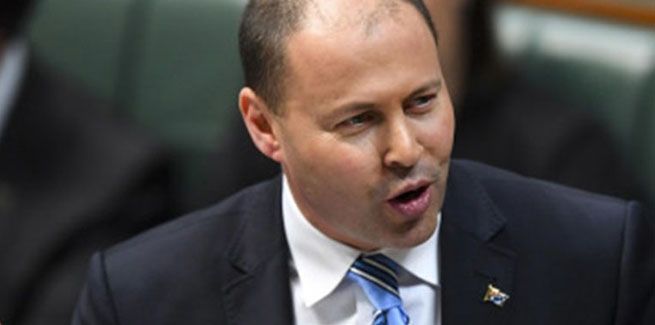In an industry forum involving approximately 1,000 members of the mortgage broking and real estate sectors, Treasurer Josh Frydenberg was asked what the Coalition would do to curb the credit crackdown if re-elected to government.
One participant specifically raised concerns over the setting of higher interest rate floors for the assessment of a borrower’s suitability for a home loan.
In response, Mr Frydenberg renewed his call for lenders to ensure they facilitate “free-flowing” access to credit but conceded that the government could not directly disrupt practices employed by private enterprises.
“Obviously, banks are independent businesses as you would understand,” he said.
“But I’ve made it very clear that the banks both have an economic and social responsibility to ensure the free flow of credit.
“We’ve seen the responsible lending obligations have some impact on the time in which loans are approved, and I did notice that the Hayne royal commission did not proceed – as some had suspected it might – with a recommendation about extending the responsible lending obligations more broadly across the economy.”
Mr Frydenberg also stressed the need for lenders to pass on cost savings through lower interest rates if the Reserve Bank of Australia (RBA) moves to cut the official cash rate.
“We will continue to make it very clear to the banks that interest rate changes should be passed on [and] that they have a responsibility to ensure that lending is certainly free-flowing across the economy,” he said.
“But at the end of the day, [lenders are] businesses and they’ve also got to manage their books.”
Minister for Treasury and Finance Zed Seselja, who also participated in the industry forum, added that the Coalition would promote legislative initiatives that foster competition in the banking sector, stating that increased competition would place downward pressure on interest rates.
Mr Seselja noted the party’s policies to retain the status quo regarding broker remuneration arrangements and provide greater access to capital for mutual and member-owned banks as part of the Coalition’s plan to improve competition in the lending space.
“We saw during the global financial crisis that there was a flight back to the big banks, and what we’ve been seeing since then is efforts to provide more competition,” he said.
The minister continued: “We think by getting more competition in the market, by having a vibrant broking industry and giving consumers that choice, it puts a lot of pressure on the banks not to increase their margins but to reduce their margins.”
Mr Seselja added that the Labor opposition’s proposal to ban trailing commissions paid to brokers and to introduce a fixed upfront commission of 1.1 per cent would curtail recent efforts to generate more competition in the marketplace.
“The opposite approach of the Labor Party will hit the mortgage broking industry, which we think will lessen competition and increase mortgage lending rates overtime,” he said.
Attack on Labor’s housing policies continues
Mr Frydenberg also flagged the perceived risks associated with Labor’s proposed changes to negative gearing and the capital gains tax (CGT), following on from strong criticism from Prime Minister Scott Morrison.
The ALP has said that if elected to government, it would limit negative gearing to new housing and halve the CGT concession from 30 per cent to 15 per cent.
“Everyone from agents to financiers, to builders, are concerned about the impact that [Labor’s proposals] will have,” Mr Frydenberg said.
Mr Frydenberg cited research, which he said highlighted the danger of Labor’s policy approach, noting independent study from SQM Research, which reported that Labor’s plan would increase rental costs by up to 22 per cent.
“If you’re in Brisbane, a traditional rental property might mean an extra $90 for you. If you’re in Victoria, it could mean an extra $55 a week for you.”
He continued: “It would also lead to an up to 16 per cent fall in housing prices as you take investors out of the market.
“The Labor Party came up with this policy at a very different time in the housing market, when prices were rising, and as we’ve seen, prices have been falling.”
The Treasurer also said he was concerned about the impact that Labor’s policies would have on the broader economy.
“Speaking from Treasurer’s perspective, at a macro level, the flow-on effect that it will have on consumer spending and household consumption is about 60 per cent of GDP,” he said.
“Many small business owners mortgage their own home to expand their own small business. If people are paying more rent, they’re going to have less disposable income.
“If people’s house prices have gone down, then this could impact on their confidence across the broader economy.”
Mr Frydenberg concluded by citing research from the Master Builders Association, which reported that Labor’s policy would lead to 32,000 fewer jobs and 42,000 fewer dwellings constructed.
Labor has fiercely defended its policy position, stating that its proposals would improve housing affordability and facilitate housing construction.
[Related: PM slams ALP’s negative gearing, CGT plans]
 ;
;
